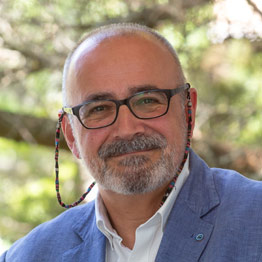15/01/2025
Published in
Diario de Navarra
Ignacio López-Goñi
Director of the Science Museum
The images of the Pamplona Planetarium in flames and the news of its destruction are a sad event for the city, for the whole of Navarra, and for all of us who are dedicated to scientific communication and knowledge dissemination in Spain.
The Pamplona Planetarium has been dedicated to knowledge dissemination and science communication for more than three decades. Since its birth in 1993, it has been a pioneering and exemplary center, and a Planetarium with a capital letter for many people and science enthusiasts knowledge dissemination . Those of us who work in this field have seen the Pamplona Planetarium and its team of work, led for many years by Javier Armentia, as a reference in science communication. A team that has been able to transmit us its passion for science.
This institution became the first center of scientific culture in our country to incorporate other cultural content to address issues of social importance in an open way and multidisciplinary: courses, conferences, concerts, theater, audiovisual shows, etc.. Activities that welcome more than one hundred thousand people every year. On the other hand, it has designed programs and activities for educational centers, reaching more than twenty thousand schoolchildren each year, more than a third of them from outside the region. Thousands of children and young people have visited the Planetarium and have been fascinated with science, in this case with astronomy, and with the knowledge of our sky.
Since its creation, the Planetarium has become one of the most active nodes in the connection between science and society. Its activity has allowed the public of all ages to become involved in the exploration of the natural world and to understand how science contributes to our well-being. And this is very important, because advancing in the scientific culture of the population means advancing in its social, economic and political development . The dissemination of science is also a way of transferring the knowledge to society.
Science is culture and scientific culture contributes to reduce fake news, hoaxes, superstitions, obscurantism... It increases the critical capacity of citizens and demolishes fears, makes people less manipulable and freer. A society that is better educated scientifically is final more democratic. We saw this, for example, with the disinformation we experienced during the COVID19 pandemic.
The Pamplona Planetarium was an institution created specifically for the scientific knowledge dissemination , and since then it has developed its work extraordinarily. Behind, we have been others who have continued with this exciting task: universities, museums, associations, etc., in many occasions collaborating with each other. It is clear that much remains to be done, but this cooperation between different institutions, especially that which includes public-private integration, is achieving that the communication and knowledge dissemination of science acquires an increasingly relevant position in Navarra.
I insist, the destruction of the Pamplona Planetarium is a great loss not only for the city and for Navarre, but also for everyone in Spain who is dedicated to this topic. For this reason, I would like to convey my support and solidarity to those who have worked and have worked for more than three decades to move forward a Planetarium that has been a pioneer and unique in Spain. It is a day of mourning for the knowledge dissemination of science in our country and I really hope that, like the phoenix, it will rise from its ashes with more strength, if possible. Our support and hugs to all the family of the Pamplona Planetarium.
------------------------------------------------
 Ignacio López Goñi
Ignacio López Goñi
Full Professor of Microbiology
Director of the Science Museum
University of Navarra
